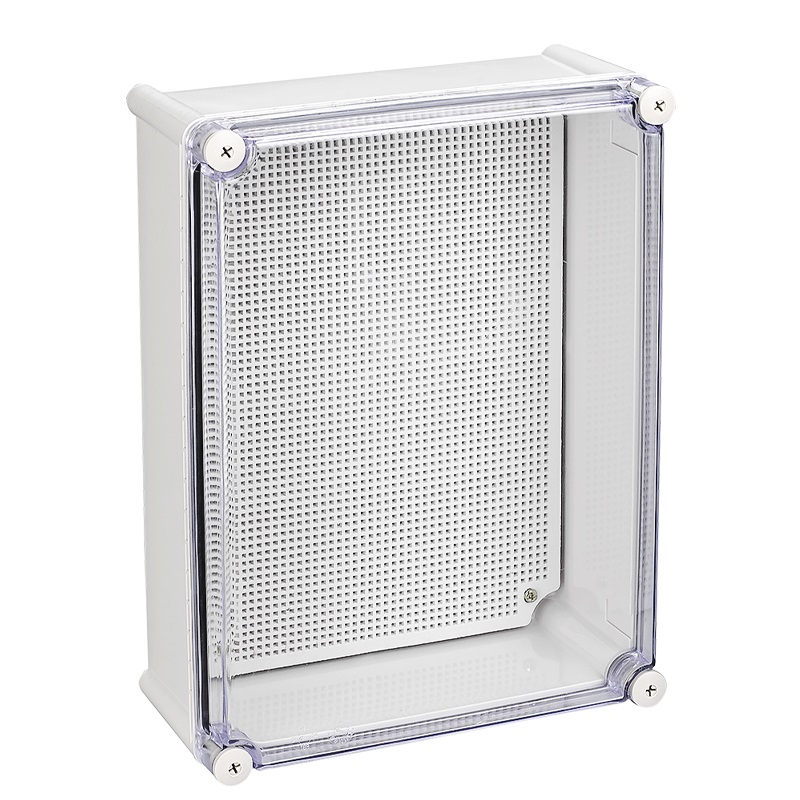
Polycarbonate enclosures are widely used in various industries for protecting electrical and electronic components. They offer several advantages due to the unique properties of polycarbonate material. Here are some of the key benefits:
High Impact Resistance
- Advantage: Polycarbonate is known for its exceptional impact strength. It is significantly more resistant to impact than other plastics like acrylic or ABS.
- Benefit: This makes polycarbonate enclosures ideal for applications where the enclosure might be subjected to physical stress, rough handling, or potential impacts (e.g., in industrial settings or outdoor environments).
Lightweight
- Advantage: Polycarbonate enclosures are lightweight compared to metal enclosures, such as aluminum or steel.
- Benefit: This makes them easier to handle, transport, and install, reducing overall operational costs and simplifying assembly.
Excellent UV Resistance
- Advantage: Polycarbonate enclosures are often treated or coated to be highly resistant to UV radiation.
- Benefit: This makes them ideal for outdoor applications where exposure to sunlight is frequent, as they won’t degrade, discolor, or become brittle over time.
Thermal Stability
- Advantage: Polycarbonate has good heat resistance and can perform well under a wide temperature range.
- Benefit: Polycarbonate enclosures are suitable for use in environments where temperature fluctuations occur or in equipment that generates heat.
Electrical Insulation
- Advantage: Polycarbonate is a good electrical insulator, making it ideal for enclosures that need to protect against electrical hazards.
- Benefit: It ensures safety for both equipment and personnel, preventing accidental electrical contact.
Clear Transparency (for Certain Models)
- Advantage: Polycarbonate can be manufactured to be transparent or translucent.
- Benefit: This allows for clear visibility of internal components, which is useful for monitoring equipment without opening the enclosure. It is often used in control panels, instrumentation, and displays.
Chemical Resistance
- Advantage: Polycarbonate provides good resistance to many chemicals, including acids, oils, and solvents.
- Benefit: This makes polycarbonate enclosures suitable for use in environments where exposure to harsh chemicals is a concern.
Versatility in Design
- Advantage: Polycarbonate is easy to mold into a variety of shapes and sizes.
- Benefit: This allows manufacturers to produce customized enclosures that meet specific design or functional requirements, which is useful for a wide range of applications.
Easy to Fabricate
- Advantage: Polycarbonate can be easily cut, drilled, and shaped.
- Benefit: This makes polycarbonate enclosures flexible and customizable, whether for creating unique sizes, adding ventilation holes, or integrating other design features.
Cost-Effective
- Advantage: While polycarbonate may be more expensive than some other plastics, it is often more cost-effective than metal alternatives (e.g., aluminum or stainless steel).
- Benefit: It provides a balance between performance and price, making it an attractive option for many applications without breaking the budget.
Applications of Polycarbonate Enclosures:
Polycarbonate enclosures are used in a wide range of industries:
- Electrical and Electronics: Protecting electrical components, control panels, and circuit boards.
- Telecommunications: Housing network equipment, junction boxes, and data distribution units.
- Industrial Automation: Protecting sensors, actuators, and control devices in factories.
- Solar Energy: Protecting photovoltaic inverters, junction boxes, and other solar equipment.
- Automotive: Protecting electrical systems and electronic devices in vehicles.
Conclusion:
Polycarbonate enclosures are favored for their combination of durability, versatility, and safety features. Whether in harsh outdoor conditions or in high-impact environments, these enclosures provide reliable protection for sensitive electronic and electrical components.


